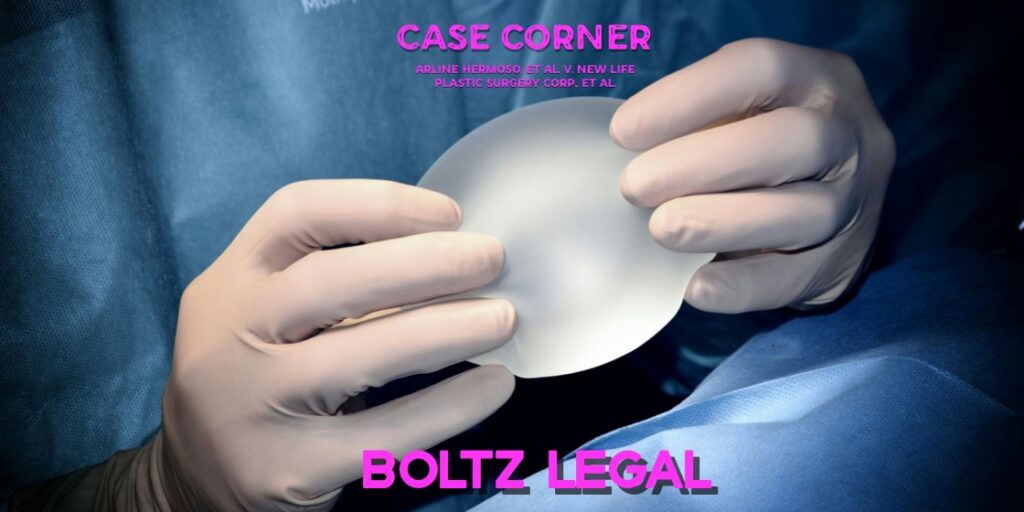Jurisdiction: Third District Court of Appeal, Florida
Case No.: 3D24-0856
Lower Tribunal Case No.: 20-24612-CA-01
Date: July 16, 2025
Lower Court: Circuit Court for Miami-Dade County, Judge Beatrice Butchko Sanchez
Failure to Comply With Medical Malpractice Presuit Requirements Leads to Dismissal
The Third District Court of Appeal upheld the dismissal with prejudice of a medical malpractice lawsuit filed by Arline Hermoso and her husband against Dr. Camille Chavez and New Life Plastic Surgery Corp. The court found the plaintiffs failed to conduct a reasonable presuit investigation as required by Florida’s Medical Malpractice Act. The decision in Arline Hermoso, et al. v. New Life Plastic Surgery Corp., et al. offers an important reminder: failure to follow presuit procedural rules—even when intentions are earnest—can doom a case before it ever reaches a jury.
Background of the Case
In 2018, Hermoso underwent breast lift and implant replacement surgery at New Life, performed by Dr. Camille Chavez. Alleging that Dr. Chavez negligently placed the implants above the muscle rather than below, and failed to provide adequate postoperative care, Hermoso filed a statutory notice of intent to initiate litigation—complete with a corroborating expert affidavit from Dr. Paul Glat.
Dr. Chavez responded by denying the claims and submitted her own expert affidavit from Dr. Darrell Henderson, defending the standard of care. Hermoso and her husband proceeded with a medical negligence lawsuit, which was later amended. However, during her deposition, Hermoso herself admitted that the implants had been placed below the muscle—the exact opposite of what her claim alleged.
The Defendants Push Back
Upon this key admission, Dr. Chavez and New Life moved to dismiss the lawsuit, arguing that Hermoso’s complaint had no factual basis and did not satisfy the presuit requirements under Florida law. Although the trial court initially denied the motion without prejudice, it later ordered an independent medical examination.
But before this could take place, Hermoso underwent another surgical procedure—without informing the defense—to have the implants removed. Dr. Jason Altman, who performed the removal, later testified that the implants were indeed placed below the muscle, corroborating Hermoso’s own testimony.
This revelation led to a second motion to dismiss, which the trial court granted—this time with prejudice.
The Appeals Court’s Analysis
On appeal, Hermoso claimed she had conducted a reasonable presuit investigation and that her expert affidavit should suffice. The Third District disagreed. Quoting directly from Florida Statutes §766.203, the court emphasized that claimants must investigate their claims and provide a verified expert opinion showing there are reasonable grounds to believe medical negligence occurred.
In this case, however, Hermoso’s entire claim was predicated on an alleged surgical error—placing the implants above the muscle—that her own testimony and later surgical removal disproved. The court found Dr. Glat’s affidavit to be completely inadequate, as it failed to reflect the actual circumstances and therefore could not satisfy the purpose of the statutory requirement: to assure both the defendant and the court that the claim is not frivolous.
Because both Hermoso and her second surgeon confirmed that the implants were placed beneath the muscle, the alleged basis for the medical negligence claim effectively disappeared. The court found no viable alternative claim (e.g., negligent post-op care) since all allegations were tied to the misplacement issue.
Legal Significance and Precedent
This ruling underscores Florida courts’ strict enforcement of the Medical Malpractice Act’s presuit notice and investigation procedures. The decision also reinforces that an expert affidavit must align with the actual facts of the case—not speculative or disproven allegations.
The court leaned on precedent such as Kukral v. Mekras and Largie v. Gregorian, reinforcing the purpose of the presuit process: to filter out frivolous lawsuits and promote early resolution of meritorious claims. The court also noted that allowing a case to proceed where presuit requirements are not met “would frustrate the purpose of the Medical Malpractice Reform Act.”
In the court’s view, Dr. Glat’s sworn statement affirming that implants were placed above the muscle—when in fact they were not—“shocks the conscience.”
Implications for Medical Malpractice Litigation
This case is a clear warning to plaintiffs and attorneys pursuing medical malpractice claims in Florida: the presuit process is not a formality. Any discrepancies between allegations and medical facts can have devastating consequences. Experts must provide opinions based on accurate evidence. Misstatements—intentional or not—can not only weaken a case but result in its outright dismissal.
Moreover, the case confirms that failure to follow presuit requirements does not entitle plaintiffs to a “second bite at the apple.” Once a trial court finds a violation, it can—and often must—dismiss the case with prejudice.
What This Means for You
While Boltz Legal does not handle medical malpractice claims, we believe in keeping the public informed about important legal rulings that shape Florida law. Understanding the strict requirements for filing certain types of lawsuits—like those involving alleged medical negligence—can help individuals make better legal decisions and avoid costly missteps. If your case involves personal injury, insurance disputes, or property damage, our experienced team is here to help.
Today’s Insight
“Facts do not cease to exist because they are ignored.”
— Aldous Huxley
If you or a loved one has experienced medical malpractice or are unsure about your legal options, contact Boltz Legal today for a free consultation. Let our experience work for you.

